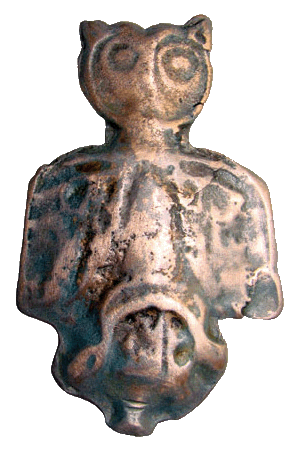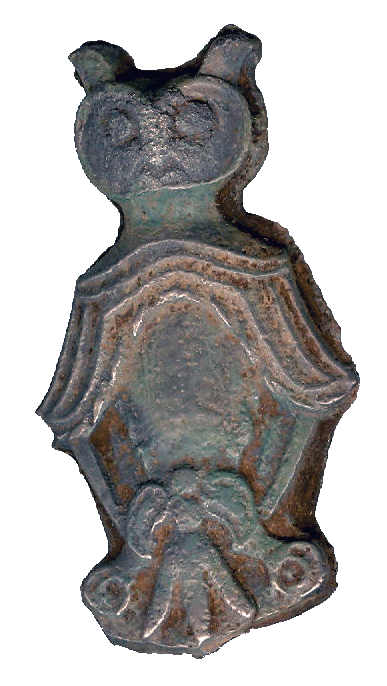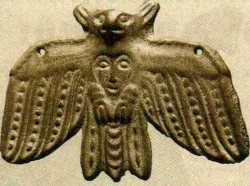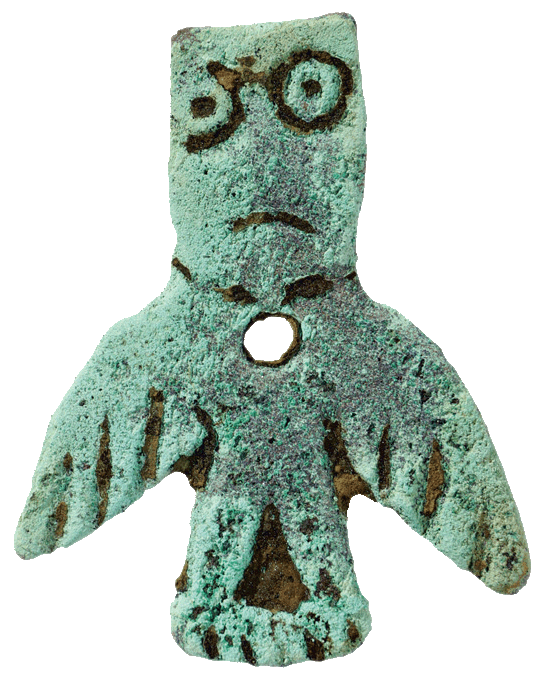Why Owl?
Surprisingly, the ancient legends about the wise owl also have archaeological evidence. Here, on the Varvarinskaya street archaeologists found Slavic and Merya ornaments of XI century - among which the most outstanding was a rare suspension of an alloy of copper, tin and silver, depicting the ancient hero - the man taming two reared horses. It could be preserved in the cultural layer of the Slavic settlement in the only way. This precious decoration was left by Merya father to his son from the Slavic girl so that he should remember his ancient roots. The archaeologists regularly find in Ples Slavic and Merya ornaments of X-XII centuries - rings, bracelets, temple rings, noisy charms with bells and duck legs loved by all of the Finno-Ugric peoples, pendants depicting horses and waterfowl.
 But one finding has surprised a lot of work of the archaeologist. Surprised and, of course, pleased. Because such finds are made maybe once in a hundred years. And here, on the Varvarinskaya Street, it happened at the end of the archaeological field season of 2014.
But one finding has surprised a lot of work of the archaeologist. Surprised and, of course, pleased. Because such finds are made maybe once in a hundred years. And here, on the Varvarinskaya Street, it happened at the end of the archaeological field season of 2014.
The hardest work for archaeologists always falls on the last days: you need to explore more recent layers and explore the pits left by ancient people. Most of these pits are of no interest. Here a wooden post was dug in - tree decayed and left dark brown circular spot drifting in red clay: the brown earth need to be carefully removed with the scoop, but no findings, of course, to see here. Around the estate there is a slender line of dark spots: the remains of an ancient picket fence. In the corner area enclosed by a palisade garbage pit is found - a great success for the archeologist because here will be found the broken fragments of pottery, fragments of iron knives, bone combs and other items of everyday life. That what could be no longer be useful in everyday life was dumped here: unfit for everyday use, but just right in order to present the everyday way of life in ancient times.
However, the most difficult task for an archeologist is imagining the spiritual world of the people who lived here once. And one such pit - in the center of the survey area, in log cabin cleared in the excavation, right in front of the stove, oven, built of flat stones. Even when the very furnace heater was cleared, it was noticed that one of the stones seems not to obey to general logic - stacked neatly, but has no relation to the furnace itself, a few inches from the furnace, in front of the house. And it is below the floor level. Later, when the oven has been completely cleared, sketched, photographed from all angles, it was the turn to remove the stone. It was then, and waited for the surprise of archaeologists. And the stone itself was unusual - it is a rare piece of red granite, chopped specially so as to give it a flat shape. Beneath this stone are the remains of rotted leather embossed with a fancy pattern and braided leather lacing. If you restore the form, the piston turns - Old Russian leather shoes with soft soles. And inside the piston there is cast silver pendant in the shape of a bird. Silver is an expensive metal. Silver pendant is a rare privilege; it was worm by a nobleman. But the bird depicted is unusual.
 More frequent in our area are water birds - ducks or geese. And here - straightened tail and wings with wide soft feathers, round almost human head with big eyes, sharp beak like a triangle and sharp ears. No need to be an expert, one can see that this is a night owl, or maybe an eagle owl, a night watchman, bird, widespread in our latitudes. However, not many people have seen it. At night you just need to go to the outskirts of Ples, go past Saint Barbara church at the foot of Holodnaya Mountain – and you will surely hear the flying night watchman. However, not everyone will be able to recognize the owl's voice. Surely, thousands of years ago the Merya tribes living here knew the voice of owls very well.
More frequent in our area are water birds - ducks or geese. And here - straightened tail and wings with wide soft feathers, round almost human head with big eyes, sharp beak like a triangle and sharp ears. No need to be an expert, one can see that this is a night owl, or maybe an eagle owl, a night watchman, bird, widespread in our latitudes. However, not many people have seen it. At night you just need to go to the outskirts of Ples, go past Saint Barbara church at the foot of Holodnaya Mountain – and you will surely hear the flying night watchman. However, not everyone will be able to recognize the owl's voice. Surely, thousands of years ago the Merya tribes living here knew the voice of owls very well.
It is complex enough to find the precious silver owl. No less complexity is to give an explanation of this finding. The fact us the owl is alien to the Slavic culture. You should immerse in beliefs of Merya tribes that Mary lived here. But this is not easy, because the Merya language is not preserved and Merya myths are not recorded. We have to rely on the analogy of the mythology of other Finnish peoples - Sami, Karelian, Volga Finns - Mari and Mordovians. And, of course, to rely on the fairy tale, which still can be heard here in the Volga provinces. For example, in the house of Grandma Xenia.
 - Grandma Xenia, tell about the owl. Why does she hoot at night? Who she guards?
- Grandma Xenia, tell about the owl. Why does she hoot at night? Who she guards?
- Owl is an old bird. Perhaps the oldest. That's because night is older than day as well. And the owl is older than daytime birds and animals. And since when the owl lives in our woods, no one knows. And only old people told me that when the first people came here, they began to conclude the contracts with all fish, birds, beasts of the forest.
Pike promised to man to drive the most fatty fish in the net. Goose said she would always lay seven eggs - six for herself, and one for man. Moose said that will go into the swamp and no cow pasture will be trampled. The man gave in response his word, that he will not take too much of anything in the water or in the woods, and only take what he needs for life.
With such persuasion man went to of all fish and animals, and birds. And last he came to the owl. Probably, because the owl was asleep and only woke up at dusk. "Well, the owl - the man says. - What will we negotiate with you? What can you give me? And what do you want from me? "
Owl turned the head in different directions, and replied: "I an owl, a night watchman. I know more than you will ever know! Sitting high up and seeing where no one is watching. Here and now I see that you, man, entered contracts with the fishes, birds and beasts of forest, but you do not know whether you have enough strength to fulfill these contracts. You promised a pike, goose and moose not to take too much, and in fact you do not know how much you need. It all seems too little to you. "
The man kept silence, as he did not know what to say.
And the owl continues: "Here I am, an owl, and I will be your guard. I will watch you closely. I will look in your very soul. And I will talk about you with the rest of the river and forest residents. If I am hooting in the night, then yes, then you, the man, follow the contract, taking not too. And if I’m laughing in a terrible voice, this means that you, man, are greedy, taking too much, so I'm releasing animals and birds from the contract with you. And I do not want anything from you, people! "
Man understood that wise owl said well and that her words are strict, but fair. He agreed to the Owl’s conditions. So he lived in peace with Owl for a long time. For every night owl gathered all the birds and fish, all the beasts of forest, and they listened carefully. And man was the chief listener: listening and controlling his greed. And so that the children know about the contract and do not forget, the man did owl figurines and put them in children's slipper: no matter where you will go the contract will go with you.
 Here's a tale told by grandmother Xenia. And the tale explains the riddle of "owl" treasure found by archaeologists. The young Merya, going to the east, in the new territory, had to leave a night watchman for his lover and his newborn son. Let ancient owl watch so that people that came to the banks of the Volga do not forget about the old contracts with the world around them. Let the very nature according to those contracts take care about people who may not even know these legends of old.
Here's a tale told by grandmother Xenia. And the tale explains the riddle of "owl" treasure found by archaeologists. The young Merya, going to the east, in the new territory, had to leave a night watchman for his lover and his newborn son. Let ancient owl watch so that people that came to the banks of the Volga do not forget about the old contracts with the world around them. Let the very nature according to those contracts take care about people who may not even know these legends of old.
That is why we decided to carefully preserve the memory of the people who lived before us a Ples. Ancient Owl guarded most of the first people in this region, as told us by grandmother Xenia. Then she started to care about the Slavs who moved in the region, and this is evidenced by the unique archaeological finds. And we named our hotel after the Great Owl. Let the night watchman and its hooting indicate that people in Ples abide by the contract with nature and the world around us will is good and comfortable.


